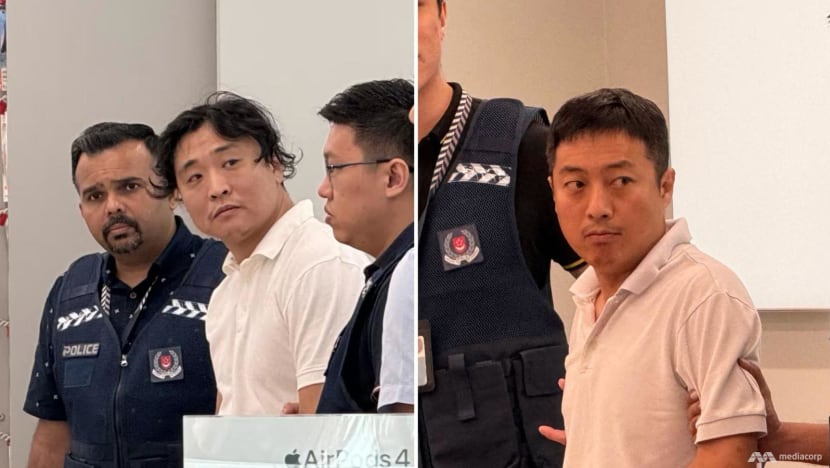Jail for two Chinese nationals who came to Singapore for syndicated credit card fraud, but backed out
The men were informed of an opportunity to make money by buying high-end goods with other people's credit cards in Singapore.

Li Xueqi (left, in white) and Xu Zhaochen pleaded guilty to being part of a criminal conspiracy by agreeing to make fraudulent credit card purchases. (Photos: 8world)

This audio is generated by an AI tool.
SINGAPORE: Two men who were high school classmates in China heard of an opportunity to earn money in Singapore by using other people's credit cards to buy high-end goods like iPhones.
Although they backed out before making the fraudulent purchases themselves, both men were hauled to court and charged with conspiring to cheat.
Li Xueqi and Xu Zhaochen, both 36, on Friday (Dec 20) pleaded guilty to a charge each of being part of a criminal conspiracy by agreeing to cheat shops into believing that they were the owners of the credit cards.
Li was jailed for 15 weeks, while Xu – who backed out of the scheme earlier – was jailed for eight weeks.
Their co-conspirators – Zhao Yongzhi, 28, and Zhang Tianyu, 29 – have been charged with cheating, and their cases are pending. In addition to iPhones, Zhao is also accused of fraudulently buying gold bars.
The court heard that Li received a message in China from a person he knew as "Huihuang", telling him he could make money by buying luxury items using other people's credit cards in Singapore.
Li was told he needed to travel to Singapore to meet some men who worked for Huihuang.
On Nov 4, Li asked Xu to join him in the scheme. They flew to Singapore the next day.
HOW THE FRAUD WORKED
Li and Xu met up with Zhao and Zhang, who explained that they would provide the pair with a specific mobile phone that Li and Xu were to use to pay for the items.
Someone would call them on the phone during a purchase and tell them what to do, and they were to use the phone to make contactless payment.
Zhao and Zhang also explained that fake Japanese passports made using Li and Xu's photos could be used as proof of identity during the purchase.
Investigations revealed that the scheme involved the use of a mobile application that could be remotely filled with another person's credit card details.
Some of the credit card details were obtained through phishing.
After hearing how the scheme worked, Xu said he did not want to take part anymore, while Li agreed to continue his involvement, Deputy Public Prosecutor Nicole Teo said.
The next day, Li met Zhao at a store selling Apple products in Marina Bay Sands, where Zhao demonstrated how to carry out the scheme.
Zhao spoke to a person on the phone and bought an iPhone 16, using the phone to make payment.
They then went to another store to make another purchase. Zhao took longer to make payment this time, and Li left Zhao in the store as he was worried about being caught.
When Zhao returned after buying a second iPhone, Li told him that he no longer wished to continue with the scheme as he was afraid of getting caught.
SYNDICATED AND SOPHISTICATED CRIME
The prosecutor sought two months' jail for Li and six to eight weeks in prison for Xu.
She highlighted the syndicated and transnational nature of the offences, and said this required a deterrent sentence to send a message to would-be offenders.
Ms Teo also said the prosecution was not attributing Zhao's fraudulent purchase of two iPhones to Li.
Defence lawyer Ms K Keerthana asked for two months' imprisonment for Li and six weeks' jail for Xu.
She argued that no actual harm was caused as Li and Xu did not commit the fraud in the end, and any potential harm was also nullified when both men chose not to proceed with the scheme.
She also stressed that Li and Xu did not know how sophisticated the scheme was at the point they agreed to join it, and decided not to participate once they were aware.
In his decision, District Judge Koo Zhi Xuan noted recent media reports about credit card fraud and said such offences must be met with severe sentences.
The police said in November that there was an emerging trend of foreigners committing credit card fraud targeting local retailers.
The Singapore's Police Force says there is an emerging trend of foreigners committing credit card fraud targeting local retailers. Since Nov 4, there have been at least 10 victims whose card details were stolen by the scammers to buy high-value goods. In total, the unauthorised transactions are worth more than S$100,000.
Li and Xu's cases showed the ease with which credit card offences could be carried out by foreign syndicates operating remotely through phone-based contactless payment, the judge said.
Such offences not only harmed the owners of the credit cards, but also took up valuable time and resources of the retailers and authorities, Judge Koo added.
The offences could also damage Singapore's standing as a financial hub and as a preferred centre of commerce, he observed.
The judge found that Xu's actions to some extent abetted and emboldened his accomplices towards the ultimate goal of fraud, even though he backed out in the end.
He also found that Li should have a much higher sentence than Xu, as Li roped Xu into the conspiracy and was instrumental in the creation of the images of the fake passports.
Judge Koo also noted that Li withdrew from the scheme later, and took the significant step of following Zhao to observe how he made the fraudulent purchases even after having the details of the scheme.
As the fraudulent purchases were partially made to demonstrate to Li how the scheme worked, Li was "arguably both a witness and abettor to the principal offences committed by Zhao", said the judge.
"Li must therefore bear some responsibility for the two iPhone 16s which Zhao had fraudulently obtained, and cannot be said to have caused no harm at all."
Li's sentence was backdated to his date of arrest on Nov 7, while Xu's sentence was backdated to his date of arrest on Nov 6.
The punishment for cheating by personation is a jail term of up to five years, a fine or both.









